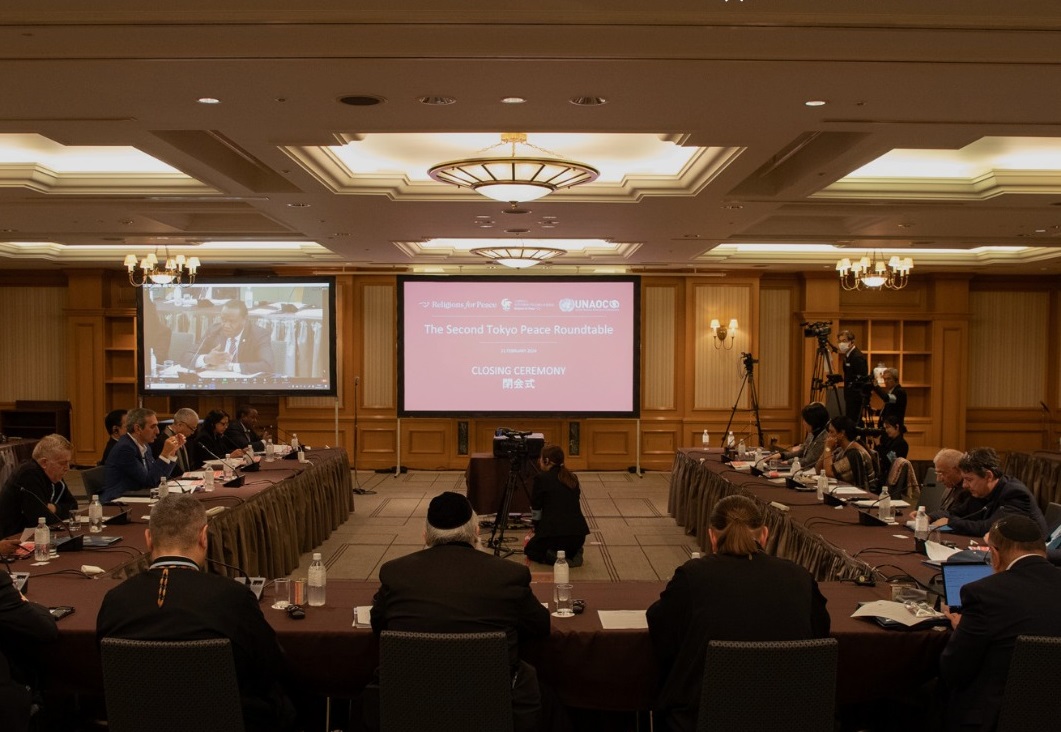Religious leaders from countries at war: respect the sacredness of lives and places of worship
The appeal contained in the final declaration of the Peace Round Table that brought together Buddhists, Christians, Hindus, Muslims and Jews in Tokyo on the initiative of Religions for Peace. "We pray and offer solidarity to those who suffer the brunt of ongoing wars and violence. Let us work together to promote the common good'.
Tokyo (AsiaNews/Agencies) - Leaders of five different religions (Buddhism, Christianity, Hinduism, Islam and Judaism) from 15 different countries marked by wars and conflicts. Together gathered around a table to reflect on their task as men of faith in promoting peace this week in Tokyo as part of the Second Round Table for Peace.
The round table is convened by the organisation Religions for Peace together with the United Nations Alliance of Civilizations promoted by the UN. Four days of discussion that saw the presence of significant witnesses including the Orthodox Metropolitan Emeritus of Chalcedon Emmnauel Adamakis, the Muslim Abdallah Bin Bayyah, the president of the Israeli association Rabbis for Human Rights Avi Dabush, and the Lutheran Bishop Emeritus of the Holy Land Mounib Yunan.
"We are deeply concerned about the unimaginable suffering that people are enduring in conflict zones around the world, including Haiti, the Middle East, Myanmar and Ukraine," the religious leaders wrote in the final statement released at the end of the meeting.
"We recognise that the foundations of peace and security are threatened in every region of the world, while the most vulnerable - women, children and marginalised populations - are caught in the crossfire and suffer disproportionately from severe violence, displacement and other human rights violations.
Inspired by the divine teachings of their own religions, the participants together reaffirmed some fundamental but nowadays terribly undermined principles in war contexts: the sanctity of life and human dignity must be upheld and protected at all times; the shared responsibility of religious leaders to foster positive peace by promoting compassion and understanding of our common humanity; the idea that the provision of humanitarian assistance to conflict-affected populations must be depoliticised and grounded in the restoration of peace, security, justice and human dignity.
"Together," they go on to write, "we call for the cessation and transformation of all ongoing wars, conflicts and the use of violence and weapons (including nuclear, conventional and cyber weapons and improvised explosive devices) on the basis of our collective responsibility to resolve disputes by peaceful means that uphold and protect the sanctity of life and human dignity, including for the most vulnerable. It also calls for 'the preservation and protection of the sanctity of places of worship and sacred sites and their free and safe access, both in times of war and conflict and in times of peace and harmony'.
Lastly, the religious leaders present pledged to mobilise their communities to "provide humanitarian assistance to war-torn communities, including the most vulnerable, and to promote interfaith cooperation for the common good and the protection of our common home" and to "build positive peace through long-term healing and reconciliation processes that prevent the recurrence and perpetuation of war and violence.
"We, religious leaders," the Tokyo Peace Roundtable statement concludes, "offer our heartfelt prayers and unwavering solidarity to those who suffer the brunt of ongoing wars and violence. We reaffirm our commitment to continue to pray and work in a multi-religious manner for a culture of peace that advances the common good, based on respect for the sanctity of life and human dignity."
10/04/2022 13:11







.png)










